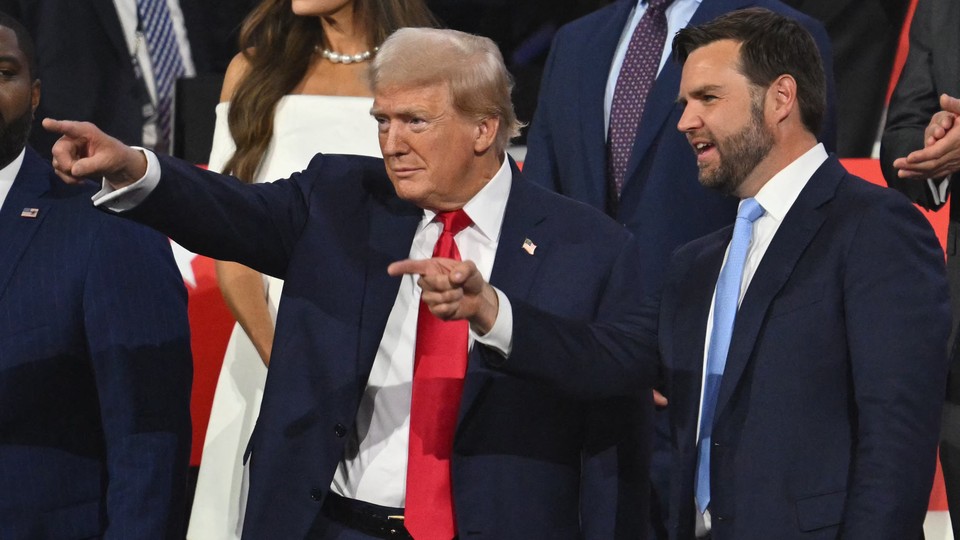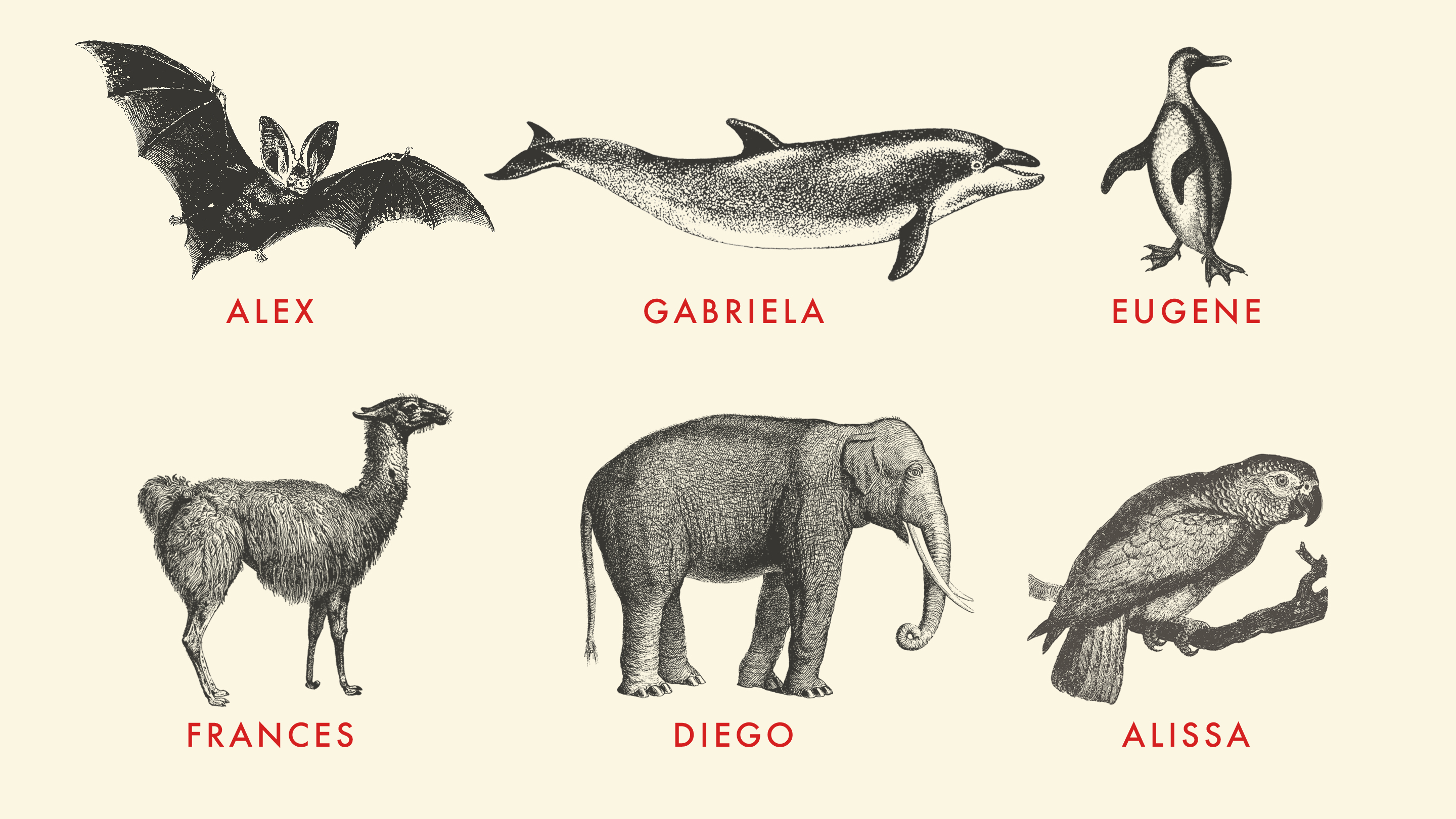More Business Leaders Are Warming to Trump’s Pitch
6 min read
This is an edition of The Atlantic Daily, a newsletter that guides you through the biggest stories of the day, helps you discover new ideas, and recommends the best in culture. Sign up for it here.
In his 2024 campaign, Donald Trump is more open about his pro-business stance than he’s ever been, and some corporate leaders have been warming to his pitch. But his choice of J. D. Vance as his running mate complicates his newfound bond with big business.
But first, here are four new stories from The Atlantic.
- The end of Biden’s candidacy approaches
- “I think it’s happening”: The dam is breaking for Biden.
- Stuart Stevens: “I thought I understood the GOP. I was wrong.”
Dropping the Act
When Donald Trump first ran for president as a Republican, he didn’t get a warm response from the elite business world. In 2016, major business leaders shunned the self-styled real-estate mogul and threw their dollars behind Hillary Clinton, reacting in part to Trump’s vocal anti-corporate rants. The business world was similarly cold toward Trump in his first bid for reelection (at least in public), and many executives denounced the January 6 insurrection. Now some business leaders are open to the idea of a second Trump term.
In recent months, wealthy businesspeople have pledged their support to Trump. Several top Silicon Valley venture capitalists are planning to donate to a Trump-aligned super PAC. The Winklevoss twins, of The Social Network fame, donated $1 million worth of bitcoin apiece, though some was refunded. And at Davos earlier this year, JPMorgan Chase CEO Jamie Dimon complimented several aspects of Trump’s first term (Trump said last month that he would consider Dimon as a future Treasury secretary).
Not every prominent executive is praising Trump, of course: For every CEO shouting about politics, many are saying nothing at all. As Jeffrey Sonnenfeld, a professor at Yale’s business school, reminded me, Elon Musk is the only CEO in the top 100 of the Fortune 500 companies pledging support for Trump so far (and how much Musk will actually give is not yet clear). Others in the business world are not explicitly endorsing Trump but are simply contending with the current likelihood of his win: The so-called “Trump trade,” the frenzy of market betting in anticipation of a GOP victory in November, has reemerged over the past few weeks, as Biden’s debate flop and the assassination attempt boosted investors’ expectations that Trump will take back the presidency.
If Trump uses his power as president to weaken corporate regulations, as he has said he will, that could lead to boom times for certain companies, especially those in the tech sector. Some investors are also betting on industries such as domestic oil and (in a grim turn of events) private detention centers that could flourish under Trump’s aggressive approach to immigration.
But Trump 2.0 may not universally boost American corporations. Stocks of chip companies such as Qualcomm and Nvidia fell yesterday after Bloomberg Businessweek published Trump’s suggestion that Taiwan should pay the United States for defense. And Trump’s new running mate has shown an openness to antitrust regulation, an isolationist approach, and an element of true economic populism that have raised alarm among business leaders. With J. D. Vance in office, a second Trump term might drift further from standard pro-business Republicanism.
Trump’s rhetoric has always been marked by a deep hypocrisy. He proclaims that he is a champion of the working class while advocating policies that would bolster the wealthiest Americans. Take, for example, his tariff plan: If he follows through on his promise to increase tariffs on foreign goods, the ultrarich would likely see lower tax rates, while the cost of living for the average American would rise. The theme of Monday night’s proceedings at the Republican National Convention (RNC) was “Make America Wealthy Again,” but the policies Trump has focused on would chiefly make America’s plutocrats wealthier. Though the GOP invited labor leaders such as Teamsters president Sean O’Brien to speak at the convention on Monday, Trump is likely to hammer unions (something he did his fair share of during his first term in office) and tilt the balance of power back to corporate bosses. Corporate America likes the sound of that.
Favoring the very rich has long been laced into Trump’s economic policies, but now he is starting to drop the populist act. During his first run, he was critical of big corporations: He accused multiple industries and companies of “getting away with murder” and initially suggested that his tax plan would hit the superrich hard (in fact, it did the opposite). As my colleague Rogé Karma wrote earlier this month, his posture has changed in his current campaign: “This time around, the former president isn’t even pretending to stand up to corporate power.” He’s rubbing elbows with well-known billionaires, telling wealthy Americans that more tax cuts are coming, and praising the crypto industry that he once accused of being scammy. Trump stands to benefit from the perception that business leaders are behind him, Sonnenfeld noted. It helps bolster the big-shot image the former president tries to cultivate—in Sonnenfeld’s words, the “Daddy Warbucks” persona.
Whatever Trump says onstage at the RNC tonight may inject further uncertainty into the stock market—and into the world. But for Trump’s supporters, the allure endures. Even in his campaign’s pro-business era, Trump is polling well with working-class voters. If Trump wins again, Rogé wrote, one powerful lesson will be that his “electoral success had more to do with his personal appeal to voters than with his unorthodox policy positions.”
Related:
- Why Wall Street won’t stop Trump
- Trump isn’t even pretending anymore.
Today’s News
- Nancy Pelosi reportedly told President Joe Biden that polls show he cannot win against Donald Trump in November. The New York Times reported that Representative Jamie Raskin of Maryland sent Biden a letter earlier this month encouraging him to consult with his fellow Democrats about whether to step down.
- Hundreds gathered in western Pennsylvania for a public visitation with the family of Corey Comperatore, a man killed at Saturday’s Trump rally.
- Bob Newhart, who transitioned from comedy-records success into a well-known TV actor, died at age 94.
Evening Read

Elephants Are Doing Something Deeply Human
By Tove Danovich
The best thing language has ever done for us, as far as I’m concerned, is give us the ability to talk with and about one another. Why bother with words if you can’t get your friend’s attention on a crowded street and pull them aside to complain about your nemesis? Language, that is to say, would be largely useless without names. As soon as a group is bigger than a handful of people, names become essential: Referring to someone who shares your cave or campfire as “that guy” goes only so far.
Perhaps because names are so crucial and personal, naming things can feel uniquely human. And until a little over a decade ago, scientists predominantly thought that was true. Then, in 2013, a study suggested that bottlenose dolphins use namelike calls. Scientists have since found evidence that parrots, and perhaps whales and bats, use calls that identify them as individuals too. In June, a study published in Nature Ecology & Evolution showed that elephants do the same. Among humans, at least, names are inextricably linked with identity. The fact that we’re not unique in using them is a tantalizing sign that we aren’t the only beings who can recognize ourselves and those around us as individuals.
Read the full article.
More From The Atlantic
- Why you should trust your gut
- “Please see Twisters in theaters,” our critic writes.
- The cheapness of luxury
- Trump signals weakness to Xi Jinping.
Culture Break

Watch. In the documentary I Am: Celine Dion (on Prime Video), Celine Dion, who has an autoimmune disease, “doesn’t talk about wanting to be well; she talks about wanting to sing,” Caitlin Dickerson writes.
Spend a moment in awe. Our photo editor Alan Taylor compiled two years of amazing images from the James Webb Space Telescope.
Play our daily crossword.
Did someone forward you this email? Sign up here.
When you buy a book using a link in this newsletter, we receive a commission. Thank you for supporting The Atlantic.



